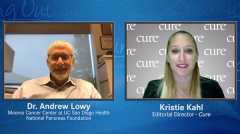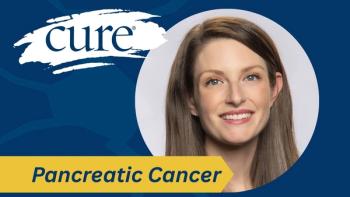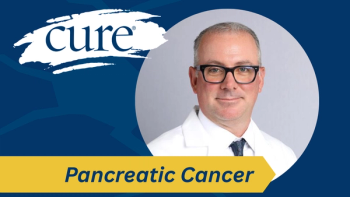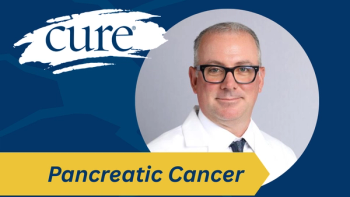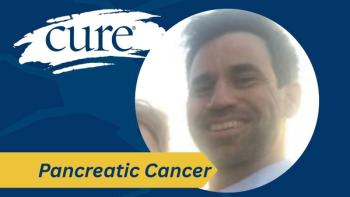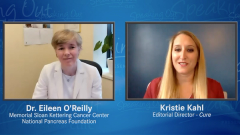
Clinical Trials in Pancreatic Cancer
Kristie L. Kahl: Why is it important for patients to consider joining a clinical trial?
Dr. Andrew Lowy: This is a topic I'm very passionate about, because our goal is to cure pancreas cancer, and make the lives of pancreas cancer patients better. And the only way we can advance in this mission is to study the new treatments that we are developing. And, you know, what I always point out to patients is every medicine that you have taken, has been studied, at some point, likely in a clinical trial. Drugs cannot get approved unless they're studied in clinical trials. So everything that we take for granted as a standard of care medicine once was the study of once was studied in a clinical trial. And so the only way we can advance is to is to study things in a rigorous way. And that's what clinical trials are all about.
Kristie L. Kahl: How can patients learn more about clinical trials that they might be eligible for?
Dr. Andrew Lowy: So there's a variety of ways obviously, your own physician or the cancer center where you're being treated usually will have information for you. But the National Cancer Institute has a great website called clinicaltrials.gov, in which you can search for a clinical trial based on a number of keywords your disease, pancreas, cancer, your stage, etc. And they will it list a lot of information about it. You know, foundations, which support pancreas cancer patients like national pancreas foundation can also can often help the American Cancer Society, the Pancreatic Cancer Action Network, all of these all these agencies are foundations are, you know, there to support you and provide information.
Kristie L. Kahl: Can you discuss the types of trials that do exist for pancreatic cancer research?
Dr. Andrew Lowy: Sure. So clinical trials are basically divided into what we call phases. Phase 1, 2 and 3 are the most common trials that you're going to hear about. And each of those phases have a different goal, and they're studying drugs at different stages of their development. So phase 1 trials are the first phase of a drug development in which the drug is being introduced into patients.
Phase 1 trials are generally designed to understand what the best dose is, or what we call the maximum tolerated dose most often, and what the side effects of the drug is. They're not designed to typically study a single disease, they're usually given to patients with multiple cancers, and usually advanced cancers who have failed or other therapies. And they are interested in the activity of the drug that is being monitored. But it's not the primary goal. Because always our first goal we treat patients is safety. And so we want to understand that drugs are safe, that they don't have side effects, which we think are intolerable or inappropriate to treat patients with. And so that's phase 1.
After phase 1, once the dose is established, and it's safe and there's a hint of efficacy, meaning that the drugs seem to have activity, they'll select a disease or a couple of diseases to study in the next phase or phase 2. And phase 2 is really this study of the phase where you're trying to get a better sense of how effective the drug is, and so that that phase will either consist of a single group of patients all who get the same treatment, or sometimes two groups of patients, who some of whom will get the study drug, and others will who will just get the standard of care agents and it depends a little bit on the design. After phase 2, when there's a sense that this drug seems to be working and we're excited about it.
Then it goes to phase 3, or we often call the registration phase and that's where the experimental drug the new drug will get compared to the previous standard of care in pancreas cancer, those trials typically consists of chemotherapy, plus the experimental drug versus chemotherapy alone since chemotherapy is the standard of care for most stages of pancreas cancer, and then if that trial demonstrates that the experimental drug improve the outcomes to the extent that we think is, is adequate to approve it, then it will become an approved drug and become a standard of care.
Kristie L. Kahl: Are there other misconceptions that maybe we can try to negate and encourage patients to want to join a trial?
Dr. Andrew Lowy: So this is a really important question that you're asking. So, first of all, it's important for patients to understand that placebo or sugar pills essentially, noneffective medicines, are almost never given in trials for pancreas cancer patients. And that's because it wouldn't be unethical to give a patient a treatment, which has no activity in a disease as significant as serious as a pancreas cancer. So usually, the trials either are a single arm, or everyone's getting the experimental drug, or a randomization where half the patients are getting, again, the standard of care. And the other half is getting the standard of care plus the new drugs. So it's an additive type of situation. There are rare situations where there's placebos, but those are situations where patients have usually been rendered free of disease after surgery, for instance, they've gotten their chemotherapy, and now you're studying whether the standard of care which would to do would would normally be to do nothing else except watch. If there's something better than that, like give a vaccine, for instance. So that would be the only circumstance where you'd be talking about a no treatment arm. And that's where no treatment is the standard.
The other misconception that people have is that somehow being on a clinical trial means you're a guinea pig, or, you know, we're experimenting. And that's just not the case. I just talked about the phases of trials, and how we don't give drugs to patients, until they've been rigorously tested for, you know, for activity and safety, and so forth. And so, you know, there are ethics Review Boards court called IR B's, which have to review every clinical trial to make sure they're ethical, before they can be opened and given to patients. And the thing that I also tell patients is clinical trials are so closely monitored, to make sure that they are adhering to the standards and to what is written in the clinical trial. There's lots of data actually suggesting that patients enrolled in clinical trials have better outcomes than patients who are not on clinical trials. And we think that's because there's a larger care team, that's, that's mandatory, there are additional people monitoring your care, making sure you get your treatment on schedule, your scans on schedule, and that your side effects are very closely monitored, which, you know, is not as rigorous always when people are treated off a clinical trial.
Kristie L. Kahl: What would you say is your biggest piece of advice for a patient who's considering joining a clinical trial?
Dr. Andrew Lowy: Well, obviously, the most important thing is to understand what the trial is about what is going to be involved, what's going to be required of you. And you know, what the potential benefits and the potential risks of you know, an experimental drug are, but I strongly encourage people to keep an open mind, one of our problems in the pancreas cancer field is all is less than 10% of patients with pancreas cancer go on a clinical trial, despite the fact that that this disease has such a low cure rate. And the only way that we can increase that curate is to get new drugs approved and to show that they work. And to do that we have to do perform these clinical trials. And so the more people who enroll, the faster we can make progress against this disease.

